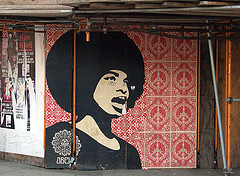 I watched the documentary film Until the Night Takes Us and was disappointed. I really think it fails on every level.
I watched the documentary film Until the Night Takes Us and was disappointed. I really think it fails on every level.
Neither a true “history” of black metal (Norwegian or otherwise) nor a revealing portrait of the genre’s main innovators (Fenriz of Darkthrone and Varg Vikernes of Burzum), the film never even raises the questions it should answer.
For example, wherein lies an engagement with or appreciation for this genre, especially in its purest, “necro” form (as one might find it on Emperor’s Wrath of the Tyrants, for example, or Darkthrone’s incomparable, Transylvanian Hunger) as an aesthetic experience?
Sure, Fenriz and Varg talk about choosing the crappiest amps and mics, etc., but why does the result sound so compellingly haunting?
And, frankly, how did it even become a recognizable genre and how do we categorize its defining characteristics?
On the other hand, where is the discussion of the neo-Nazi ideology associated with this music, so associated with it, in fact, that there is a sub-genre known as NSBM, or National Socialist Black Metal? I use the term “sub-genre” here guardedly since some of the genre-defining artists have produced music that falls squarely in this dark realm.
On that last front, why don’t the filmmakers actually call Varg on his bullshit?
For example, during the segment about his trial for the murder of Euronymous, Vikernes states that he was given a stiff sentence (by Norwegian standards, not American) because, in his words, the authorities wanted to say, “We don’t tolerate this kind of rebellion.” What kind of rebellion was that exactly? Stabbing a man, fleeing from you in his underwear, to death?
Varg is also shown saying, “It’s very hard to recognize the truth, when you are bombarded by lies all the time.” This may sound noble, until you realize that this is the kind of “truth” he’s after:
If we have a positive relationship to our homeland, to our blood, to our race, to our religion and to our culture we will not destroy any of this with modern “civilization” (id est capitalism, materialism, Judeo-Christianity, pollution, urbanization, race mixing, Americanization, socialism, globalization, et cetera). The “nazi ghost” has scared millions of Europeans from caring about their blood and homeland for sixty years now, and it is about time we banish this ghost and again start to think and care about the things that (whether we like it or not) are important to us.
Finally, why do they let it slide when Hellhammer—known for saying things like, “Black metal is for white people”—refers to the man Bård Guldvik “Faust” Eithun (erstwhile drummer of Emperor) killed as a “fucking faggot”?
I’m sure they’d fall back on the “we’re letting our subjects speak for themselves” ethos of some documentarians (and if you’re reading this, please feel free to comment!) but even there they don’t let their subjects speak enough or at length. One of the most interesting segments involves Fenriz being interviewed by a German journalist (in which he says, “We’re not just sitting around in a trailer camp listening to Anthrax!”). Why couldn’t we have more of his views or ramblings (and, while we’re at it, a conversation about his use of the phrase “Norwegian Aryan Black Metal” back in the day)?
For good or ill, I don’t tend (any longer) to reject music or other works of art based (solely) on the politics or behavior of the maker.
Nevertheless, I firmly believe that one should at least explore the ways that politics and aesthetics inform and influence each other and, if only on a personal level, ask ourselves why our response to something, on a visceral level, may be positive when we would reject it on an intellectual level.
Anyway, if you have the time and interest, Lords of Chaos is a much more satisfying account of black metal, its origins, and its consequences.
 When I was a student, I was a communist sympathizer.
When I was a student, I was a communist sympathizer.



